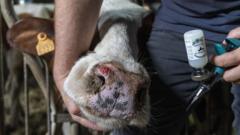Is Vaccine Skepticism Hurting Bluetongue Jab Rates?

Understanding Vaccine Scepticism and Misinformation in the Context of Bluetongue Vaccination
Vaccine scepticism and misinformation are emerging as significant barriers to the uptake of bluetongue vaccinations among livestock farmers in Wales. The urgency of this issue has been highlighted by senior veterinarians, who are concerned about the potential health risks posed by the bluetongue virus to farm animals. As of now, less than 1% of Wales' eight million sheep have been vaccinated against this potentially fatal virus, raising alarms within the agricultural community. The situation is exacerbated by recent movement restrictions of livestock from England into Wales, due to new bluetongue cases reported near the border in Herefordshire.
Farmers and veterinarians are sounding the alarm, warning that if bluetongue spreads into Wales, the consequences could be catastrophic for the region's livestock industry. Despite the lack of threat to human health or food safety, bluetongue can severely affect ruminant livestock, including sheep and cattle. The Royal Welsh Agricultural Show serves as a platform for veterinary and farming organizations to advocate for increased vaccine uptake, emphasizing the critical role vaccination plays in safeguarding animal health.
The Nature and Impact of Bluetongue Virus
Bluetongue is a viral disease primarily transmitted by midges, which thrive in warmer climates. The disease has been noted for its non-threatening nature to humans; however, it poses serious risks to livestock. The symptoms can include fever, swelling, and in severe cases, death. Livestock farms form the backbone of the agricultural landscape in Wales, and a bluetongue outbreak could decimate herds and flocks, leading to substantial economic losses.
Recent outbreaks in the Netherlands have led to tens of thousands of sheep fatalities, and midges have since spread the virus to livestock in the south-east of England. The situation has prompted movement restrictions to mitigate the risk of bluetongue's incursion into Wales. As of July 1, the entirety of England has been classified as a restricted zone for bluetongue, underscoring the urgency of the situation.
The Role of Misinformation and Vaccine Scepticism
Veterinarians like Phil Thomas from the Wales Veterinary Science Centre have pointed out that misinformation is rampant among the farming community. Many farmers believe that bluetongue is a distant threat and downplay its potential impact. This misconception, coupled with a growing scepticism towards vaccinations—exacerbated by the COVID-19 pandemic—has resulted in hesitancy regarding the bluetongue vaccine.
Veterinary professionals are encountering resistance from farmers who perceive the disease as harmless and believe it won’t reach Wales. This disconnect between reality and perception poses a significant threat, as the risk of an outbreak remains high, and the impact could be disastrous.
Consequences of Infection on Livestock
Studies conducted on affected farms in the south-east of England have revealed troubling long-term consequences of bluetongue infections. For instance, a sheep farm reported that 30% of its animals fell ill, and while 5% died, the surviving rams became infertile, and ewes delivered deformed lambs. In another case, a suckler herd experienced a dramatic decline in calf births, with fewer than 60 calves born the year after infection from an original herd of 120 cows. The economic implications of such losses are staggering, especially if the virus enters the livestock-dense areas of Wales.
Efforts to Increase Vaccine Uptake
A concerted effort is underway to increase the uptake of bluetongue vaccinations in Wales. An industry-wide social media campaign has been launched, with farmers and veterinarians urging their peers to vaccinate their livestock. Despite these efforts, the current figures indicate a concerning lack of response. As of now, only 154,260 vaccines have been prescribed in Wales, which includes 103,970 cattle and 48,904 sheep.
At livestock markets, many farmers remain uninformed or hesitant to vaccinate. For example, farmers in Carmarthenshire expressed their concerns about the costs associated with vaccination, particularly in an already challenging economic environment where input costs for fertiliser and feed are rising. The price of vaccination—between £2.50 to £3 per sheep and £5 to £6 per cattle—adds another layer of complexity to the decision-making process for farmers.
The Call for Government Support
There is a growing chorus of voices within the farming community calling for the Welsh government to provide financial assistance for vaccination costs. Farmers like Kevin Page argue that additional support could significantly alleviate the financial burden associated with vaccinating livestock. Such measures could incentivize farmers to take proactive steps in protecting their herds from bluetongue.
Long-term Benefits of Vaccination
Despite the current challenges, experts like Helen Roberts from the National Sheep Association (NSA) emphasize the importance of vaccination as a long-term protective measure. Vaccinating now not only safeguards livestock this year but also establishes a foundation for next year's health. The NSA is pushing for research into the efficacy of the vaccines, particularly regarding their ability to prevent viremia—the circulation of the virus in the blood—among vaccinated sheep. Such advancements could lead to an easing of cross-border movement restrictions for vaccinated animals, further incentivizing farmers to vaccinate.
Addressing Trade Disruption and Future Planning
The ongoing movement restrictions due to bluetongue have raised concerns regarding trade disruptions along the Welsh border. The NSA is urging the Welsh government to develop a comprehensive plan addressing these challenges and providing clarity for farmers during peak sales periods for breeding rams and ewes. As the situation evolves, timely communication and action from government officials are crucial for mitigating the impacts on farmers and the broader agricultural economy.
The Government's Stance and Future Outlook
Deputy First Minister Huw Irranca-Davies has reaffirmed the Welsh government's commitment to preventing the spread of bluetongue, assuring farmers that efforts are underway to buy time for vaccination. However, he warns that any adjustments to movement restrictions increase the risk of disease incursion. With ongoing updates from veterinary officials, the Welsh government remains vigilant in its approach to managing this critical situation.
Conclusion: Bridging the Gap Between Awareness and Action
The challenge of vaccine scepticism and misinformation in the context of bluetongue vaccinations represents a significant hurdle for livestock farmers in Wales. As the risk of an outbreak looms, it is imperative for farmers to prioritize vaccination to protect their herds and mitigate potential economic losses. The efforts to combat misinformation must be bolstered by government support and cooperative initiatives among farmers, veterinarians, and agricultural organizations.
As vaccination campaigns continue, it is essential to remain proactive, informed, and engaged with the ongoing situation. The health of livestock is not only vital for farmers but also for the agricultural economy of Wales as a whole. Farmers must weigh the risks and benefits of vaccination seriously, as the consequences of inaction could be far-reaching. The question remains: will the agricultural community rally together to protect their livestock against bluetongue, or will hesitance and misinformation prevail?
FAQs about Bluetongue Vaccination
What is bluetongue, and how is it transmitted?
Bluetongue is a viral disease transmitted primarily by midges. It affects ruminant livestock like sheep and cattle, leading to severe health implications. The virus does not pose a threat to human health or food safety.
Why is vaccination important for livestock?
Vaccination is crucial for preventing the bluetongue virus from spreading among livestock populations. It helps protect the health of animals and minimizes economic losses for farmers.
What are the costs associated with bluetongue vaccination?
The cost of vaccinating sheep ranges from £2.50 to £3, while the vaccination for cattle costs between £5 and £6. Many farmers are concerned about these costs amidst rising agricultural expenses.
What measures are being taken to combat misinformation about bluetongue?
Veterinary and farming organizations are actively engaged in campaigns to dispel misinformation and promote the importance of vaccination among farmers. Increased awareness is key to overcoming vaccine scepticism.
As we navigate these challenges, the agricultural community's response will ultimately determine the future health and viability of livestock farming in Wales. #Bluetongue #LivestockHealth #VaccinationAwareness
Published: 2025-07-21 22:00:10 | Category: wales



